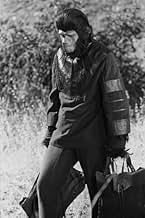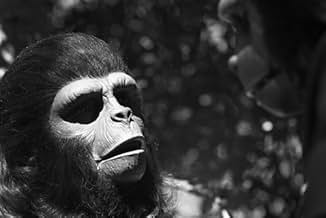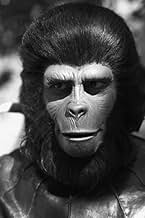IMDb-BEWERTUNG
7,0/10
5779
IHRE BEWERTUNG
Zwei Astronauten und ein sympathischer Schimpansenfreund sind Flüchtlinge in einer zukünftigen Erde, die von einer Zivilisation humanoider Affen beherrscht wird.Zwei Astronauten und ein sympathischer Schimpansenfreund sind Flüchtlinge in einer zukünftigen Erde, die von einer Zivilisation humanoider Affen beherrscht wird.Zwei Astronauten und ein sympathischer Schimpansenfreund sind Flüchtlinge in einer zukünftigen Erde, die von einer Zivilisation humanoider Affen beherrscht wird.
Folgen durchsuchen
Handlung
WUSSTEST DU SCHON:
- WissenswertesThough uncredited, Rod Serling wrote the original treatment and two proposed scripts for this series, essentially creating the basic format followed by the program, two astronauts and one chimpanzee pursued by the Apes civilization. However, his storyline involving the magnetic disc ended up being dropped by the show's writers, putting an end to the series' only story arc.
- PatzerIn many of the interior close-up shots, the actors' own teeth are visible behind the teeth of their ape masks.
- Alternative VersionenIn 1981, selected episodes were re-edited into five made for TV movies: Back to the Planet of the Apes (1981) Forgotten City of the Planet of the Apes (1981) Treachery and Greed on the Planet of the Apes (1981) Life, Liberty and the Pursuit of the Planet of the Apes (1981) Farewell to the Planet of the Apes (1981). One episode, "The Liberator," was not aired during the original network run, but was aired in the UK and made its US debut in the 1990s.
- VerbindungenFeatured in Behind the Planet of the Apes (1998)
Ausgewählte Rezension
I have just returned from the Chiller Theatre Convention in NJ (April 25, 2004), where my children and I met in person with Ron Harper who played Alan Virdon in the "Planet of the Apes" television series. We encountered a genuinely "good guy", much like the noble character he played on the "Planet of the Apes" television series. The meeting made a favorable impression upon my children -- Mr. Harper's autograph is already framed and hanging on their wall.
I enjoyed the "Planet of the Apes" television series as a child when it first aired in 1974, so I was intrigued to watch it again on DVD with my children. After watching the DVDs, I can report that I still enjoy the show. It is a shame that the series only ran for 14 episodes. Perhaps if Galen, Burke, and Virdon had been renewed for another season, the story lines would have broken-free from "The Fugitive"-type theme that dominated its (much too short) run? Even so, some of the episodes were of high quality, and, in my opinion, were actually as good as (if not better than) my two least favorite of the full-length "Planet of The Apes" motion pictures: "Escape from the Planet of the Apes" and "Battle for the Planet of the Apes". In particular, the episodes of the television series which took place within devastated city ruins standout in my mind as quite excellent television productions. I suggest that a single "Best of" DVD be released containing four of the better episodes for those fans who will find the $40 to $50 price tag for the Complete Series too steep.
Some have questioned the logical inconsistencies in the television series. They note that some things that happen in the television series contradict things that happened in the films. One problem with their arguments -- with the introduction of time travel, the notion that history can be altered repeatedly by those who travel through time is introduced. Thus, the appearance of a dog in 3085 (the year depicted in the television series) does not contradict the claim made in "Conquest of the Planet of the Apes" that all cats and dogs were killed-off in the late-20th Century. Theoretically, a future time traveler might have traveled back in time and caused an event that saved dogs from annihilation. Also, it is conceivable that dogs were re-introduced into society somewhere between the late-20th Century and 3085, as scientific advancements in genetics made it possible. So, there is little merit to the argument that some events depicted in the television series don't jibe with events depicted in the films.
I feel that this television series very competently portrayed a believable ape-dominated world of the future. I recommend this box set, but with a caveat -- take your time getting through the 14 episodes, as the underlying "fugitive-on-the-run" theme can get monotonous if you watch all the episodes one-after-another.
I enjoyed the "Planet of the Apes" television series as a child when it first aired in 1974, so I was intrigued to watch it again on DVD with my children. After watching the DVDs, I can report that I still enjoy the show. It is a shame that the series only ran for 14 episodes. Perhaps if Galen, Burke, and Virdon had been renewed for another season, the story lines would have broken-free from "The Fugitive"-type theme that dominated its (much too short) run? Even so, some of the episodes were of high quality, and, in my opinion, were actually as good as (if not better than) my two least favorite of the full-length "Planet of The Apes" motion pictures: "Escape from the Planet of the Apes" and "Battle for the Planet of the Apes". In particular, the episodes of the television series which took place within devastated city ruins standout in my mind as quite excellent television productions. I suggest that a single "Best of" DVD be released containing four of the better episodes for those fans who will find the $40 to $50 price tag for the Complete Series too steep.
Some have questioned the logical inconsistencies in the television series. They note that some things that happen in the television series contradict things that happened in the films. One problem with their arguments -- with the introduction of time travel, the notion that history can be altered repeatedly by those who travel through time is introduced. Thus, the appearance of a dog in 3085 (the year depicted in the television series) does not contradict the claim made in "Conquest of the Planet of the Apes" that all cats and dogs were killed-off in the late-20th Century. Theoretically, a future time traveler might have traveled back in time and caused an event that saved dogs from annihilation. Also, it is conceivable that dogs were re-introduced into society somewhere between the late-20th Century and 3085, as scientific advancements in genetics made it possible. So, there is little merit to the argument that some events depicted in the television series don't jibe with events depicted in the films.
I feel that this television series very competently portrayed a believable ape-dominated world of the future. I recommend this box set, but with a caveat -- take your time getting through the 14 episodes, as the underlying "fugitive-on-the-run" theme can get monotonous if you watch all the episodes one-after-another.
- CelluloidTime
- 26. Apr. 2004
- Permalink
Top-Auswahl
Melde dich zum Bewerten an und greife auf die Watchlist für personalisierte Empfehlungen zu.
Details
- Erscheinungsdatum
- Herkunftsland
- Offizieller Standort
- Sprache
- Auch bekannt als
- Planet of the Apes
- Drehorte
- Produktionsfirma
- Weitere beteiligte Unternehmen bei IMDbPro anzeigen
- Laufzeit47 Minuten
- Farbe
- Seitenverhältnis
- 4:3
Zu dieser Seite beitragen
Bearbeitung vorschlagen oder fehlenden Inhalt hinzufügen

Oberste Lücke
By what name was Planet der Affen (1974) officially released in India in English?
Antwort

































